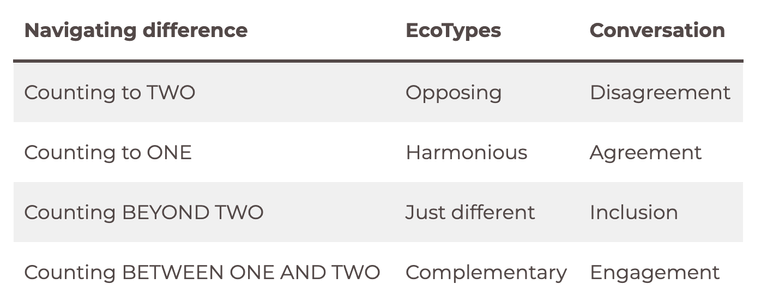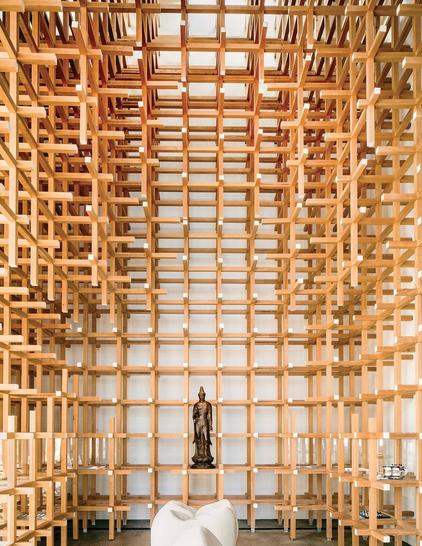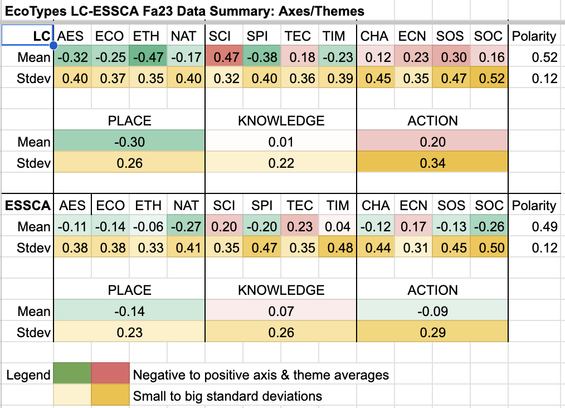How do you navigate difference? It's a broad question, I know, but one for which my #ecotypes initiative ultimately offers guidance. See four ways, attached and here: https://ecotypes.us/going-deeper/ecotypes-reflection-form/
Jim Proctor (https://jimproctor.us) is a geographer and professor of environmental studies at Lewis & Clark College (USA), specializing in environmental theory. One recent project is EcoTypes (https://ecotypes.us), a survey-based exploration of environmental difference. Jim is an avid (if slow) biker and runner, a singer-songwriter, and advanced student of Kojosho, a soft martial art. Jim also founded Alder Creek Community Forest (https://aldercreek.org) in rural Oregon.
Not much overlap I suspect btw #mastodonians and members of @aess, but lmk if interested in environmental frameworks mingle I'm leading on 14 Nov: https://aessonline.org/event/frameworks-mingle/?event_date=2023-11-14
EcoTypes website and survey now freely available in multiple European (& potentially other) languages. Interested? Contact me for a group code. https://ecotypes.us
How do EcoTypes compare among students in US vs. France? Linked URL is a comparison of two institutions. Biggest difference: preference for small vs. big Action. https://bit.ly/etlcesscafa23
Hello, fellow #mastodonians, and sorry to be out of touch...teaching is a full-time job, no? Shared this NYT op-ed yesterday with students in context of #populist distrust in institutions across political spectrum, and #polarization resulting in trust feeding distrust feeding trust across same spectrum. Would you say the same is true outside of the U.S.?: https://www.nytimes.com/2023/10/03/opinion/science-americans-trust-covid.html
My students, mostly white upper middle class, find inspiration in what they read of #Indigenous peoples of #northamerica. This is good!...but it may just be a search for #purity, with earlier icons such as #wilderness now abandoned. This quiet little NYT article of a woman who made beautiful basketry offers a more variegated story: https://www.nytimes.com/2023/09/05/arts/design/washoe-baskets-louisa-keyser-native-americans.html
Quick help request: #ecotypes now testing major #european languages via #google translate (neural). #GDPR compliant. How well does the translation work for your language(s)?: https://ecotypes.us/
I'm surprised how #highered courses often take #climateanxiety as a given: a justified response to the facts of climate change. But this research in #germany suggests otherwise. Maybe the fuller facts might help reduce climate anxiety? https://link.springer.com/article/10.1007/s10584-023-03518-z
Some approaches to scholarship, like #participatoryactionresearch, seek a union between #scholarship and #activism. But I prefer a healthy tension between the two, possibly summarized via this diagram...thoughts/questions before I discuss with students next week? Thank you.
Reading this review of the new #naomiklein book. I guess when you say “I’ve always called my writing ammo for activists,” it's hard to think hard about misplaced certainties across the full right/"diagonalist"/left spectrum: https://www.nytimes.com/2023/08/30/magazine/naomi-klein-doppelganger.html
Just out: "Ambivalence and difference: counting between one and two in ESS [environmental studies & sciences]": https://rdcu.be/dkqzq.
May use #Fukushima discharge of #radioactive water in fall environmental #engagement class. It's a reminder that (dis)trust comes before (dis)belief—as @NYTimes article suggests, root of regional concerns is political vs. scientific, hence solution is more than sharing facts; it's the much longer process of repairing trust: https://www.nytimes.com/2023/08/25/world/asia/fukushima-water-seafood-japan-china.html?smid=url-share
More on #Latour, two #modernities, and #ecomodernism, which appears to build on classic linear #modernization theory along Rostowian lines. What if We Have Never Been Modern in the #GlobalNorth / #GlobalSouth?: https://revisesociology.com/2017/09/19/modernization-theory/
Building on my recent #Latour post: scholars of #modernity often propose two successive phases, where recent is "liquid" (Bauman) vs. earlier "solid," "reflexive" (Giddens/Beck et al.) vs. classic, etc. But, building on Latour, there never was a "solid," classic modernity; it's just how modernity has represented itself. So what, then, of #ecomodernism, which unabashedly invokes classic modernity? Minimally, a key ecomodernist tenet, #decoupling, is in need of better #theory.
Re-reading the #Latour classic We Have Never Been Modern in early stages of writing critique of #ecomodernism à la @TheBTI (see 2015 link). Tentative argument: two modernities, two ecomodernisms, along lines of this Latour figure, and invoking earlier BTI Death of Environmentalism (2004), which celebrates mixing as much as ecomod celebrates purification. Thoughts?: http://www.ecomodernism.org
Also finished an #ecotypes followup reflection form, freely available for your use as well: https://ecotypes.us/going-deeper/ecotypes-reflection-form/
Hi all, back again, finished an #ecotypes card game!...feel free to use in your classes: https://ecotypes.us/ecotypes-components/global-priorities/#sdggame
We often hear #environmental values talk: "The problem is that people don't value nature," or "Conflicts over climate policy are ultimately about values." Outside of the psychological literature, this values talk is vague/unhelpful. I've tried alternatives this year to broadly communicate #ecotypes—e.g., frameworks, worldviews—reserving my more theorized notion of #imaginaries for fellow scholars. But now I think I'll just call them that. What does "imaginaries" conjure in your mind?
I often listen to podcasts on the road. One I heard this wknd got me thinking of the power of naive belief: #thisamericanlife, "I Can't Quit You, Baby." The narrator tried a hugely popular stop-smoking method...and it didn't work for him, likely because it disregards the neurobiology of nicotine. So, is learning empowering or disempowering??: https://www.thisamericanlife.org/806/i-cant-quit-you-baby
Goodbye Holocene, hello #Anthropocene? My post just out on @TheBTI site exploring the moral of the Anthropocene story now that an origin date has effectively been proposed, concluding by honoring #brunolatour and his brief Love Your Monsters essay: https://thebreakthrough.org/blog/goodbye-holocene-hello-anthropocene



